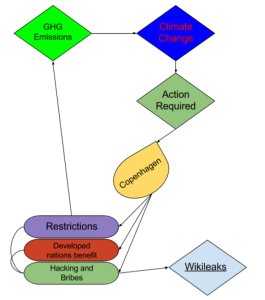My diagram simply portrays the relationship among all the factors in between the subjects of climate change, and the Wikileaks’ cables. Although it stops at Wikileaks on one side, a cyclic behavior can be seen on the other side. Ideally, the cyclic process can be slowed down if restrictions effectively help decrease overall emissions before it’s so late that all hope is lost. The diagram also portrays how hacking and bribes were what ultimately led to the Wikileaks, which in my opinion were bound to happen (even overdue). When global climate change became evident enough of an issue, the Copenhagen Accord was the United Nations’ ideal call for action. Nations like the United States displayed heavy interest in the global deal as it showed potential advantages and even complete problem solutions. In order to better persuade developing nations to get on board with the accord, the US used spying efforts, along with cyber attacks on countries’ databases in order to collect resourceful data that could be used in the United States’ favor. The United Nations call for action aimed to cut down on global greenhouse gas emissions by the year 2020. The Wikileaks became the bridge that linked the public’s level of knowledge to the United States’ role in getting to the Copenhagen Accord, which included cyber attacks, bribes, data breaches, and international threats. With the recent “Panama Papers” leak, I think A LOT more essential information like this will soon surface, taking into consideration the notable size difference in data.
As respectful as I am of others’ privacy, I do believe the United States Government deserved for this information to be leaked. First, it serves the US right to have their data breached in the same manner they were attempting to breach others’, which can serve as a solid lesson. Asides from that, I also believe the American public has a given right to be made aware of what’s really going on when it comes to international policy, and the practices that tie to it. Although the American public is deserving of information this sensible, it can be beneficial for the rest of the world as well, making other nations more aware of how we (The US) play a role with climate change, as opposed to how we portray it to be. I think spying, data breaching, and hacking are all dirty and corrupt ways to push for an agreement such as the Copenhagen Accord, which can all tie back to financial status, and the role money plays when it comes to global action. Asides from the ethical conflicts faced in this whole dilemma, it also shows how vulnerability is a serious factor, and how powerhouse governments like the United States use this vulnerability in their favor in order to get what they want. As mentioned earlier, the Panama Papers was notably denser than the Wikileaks, and I think once all that data has been sorted through by journalists and investigators, a lot more information similar to this will be made available to the public.


Hey Amir,
I can definitely see where you’re coming from with a lot of your diagram, but maybe one thing you could consider is putting explanation links with the arrows between your boxes to further show the relationships. I also can see where you’re coming from with the argument that people deserve to have transparency with government affairs like when the U.S. government spied on other countries. However, I think the ultimate greater good is at stake.
Hannah
http://geog030.dutton.psu.edu/2016/04/12/module-9-what-is-the-cost-of-the-greater-good/
Hi, I’m Jim and here is a link to my blog: http://geog030.dutton.psu.edu/2016/04/11/56001/
I enjoyed your diagram, very original and colorful. Ending with wikileaks was something that I did not do but makes a lot of sense in this context. Also tying the restrictions, hacking, and benefits together was very good! I agree that the way the accord was put together was dirty but I do not necessarily agree that it should have been leaked. The United States was using diplomatic and financial pressure to accomplish something that probably could not have been done any other way.